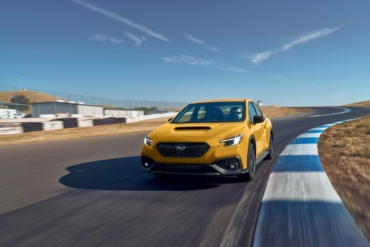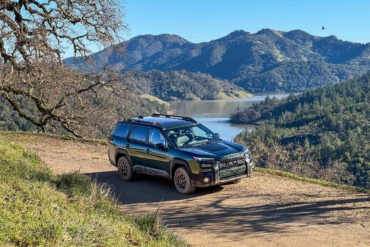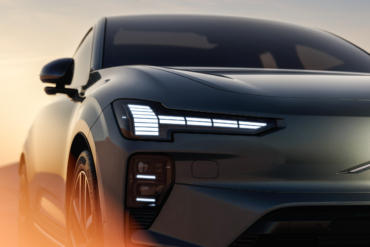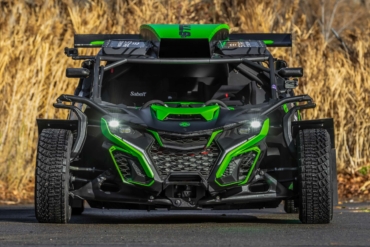The superior properties of ceramic window tint will boost comfort and visibility with less heat and glare.
In areas where the sun shines the brightest, window films provide one of the best upgrades for controlling cabin temps and warding off skin cancer when driving during the daytime. However, ceramic window tint is significantly more effective at blocking solar energy while appearing virtually clear or lightly tinted.
In effect, it simultaneously allows the most visible light through and shuts out a large percentage of the heat-producing infrared rays. How cool is that?
Nano-ceramic window tint formulations are gaining popularity because they keep the cabin cool without resorting to darker shades discouraged by law enforcement. Moreover, they are not as expensive as you might think. The cost difference between metallic dye and ceramic is close enough, such that some window tinting shops now only install the ceramic film.
Key Benefits of Nano-Ceramic Window Tint
- Nano-tech delivers superior infrared heat rejection while appearing virtually clear and reducing glare
- Reduces the risk of skin cancer and breakdown of interior materials by blocking harmful UV rays
- Will not interfere with cellphone, satellite, or GPS navigation signals
- Limited lifetime warranty offered by top-tier manufacturers
Ceramic Window Film Explained
Scientists use nanotechnology to formulate a layered film that reflects more longer-wavelength infrared energy while allowing shorter-wavelength visible light to pass through. Consequently, it elevates heat rejection without resorting to ultra-dark shades.
Nanoparticles of ceramic can block 99% of harmful UV radiation that can cause damage to the skin and break down the interior materials of your vehicle’s cabin, not to mention rejecting a fair amount of IR rays that warm the inside of your car.
For these reasons, the Skin Cancer Foundation approves all of the brands listed in this article for reducing the risks of basal cell carcinoma, squamous cell carcinoma, melanoma, and other types of scary-sounding cancerous skin growths.
“Ceramic is one of the earth’s most timeless insulators and heat-resistant materials,” said Steven Schroer, Sales & Marketing Manager for the Americas at Solar Gard. “Take those properties and bring them down to a size where they can impact and absorb a spectrum of non-visible light associated with heat, and you greatly reduce the thermal load inside your vehicle.”
The makers of this window film were successful at creating a formula to utilize nano-ceramic compounds for improved visibility and durability. Indeed, the films also have higher color stability and superior heat rejection properties in contrast to dyed and metalized window films. While the nano-tech in ceramic window films has been around for over a decade, a few manufacturers went back into the lab and developed newer formulations with better properties.

Reasons to Tint Your Windows Using Ceramic Film
- Comfort: Strong heat rejection reduces the load on AC and electrical systems on hot days. Energy conservation becomes especially important for EV and PHEV cars.
- Health: Block the sun’s harmful UV rays that age your skin and damage the interior materials of your car.
- Maximum visibility: Lighter shades can block more heat and allow excellent visibility at all times of the day and during rowdy weather conditions.
- Style: Enhance the look of your vehicle.
- There is less glare.
What Makes Ceramic Window Film Special?
- A non-metal formula that won’t block GPS navigation or electronic signals
- Resistant to discoloration and hazing
- Maximum IR rejection to block heat
- 99% UV-A and UV-B protection
- Glare reduction
- High-quality adhesive
- A film thickness of about 1.5 mil
- Limited lifetime warranty
A great window film for all your needs does the best of everything from heat reduction, to IR blocking, to glare and fade reduction, and includes a solid warranty that backs the product 100%.
Best Ceramic Window Tints
Here are some of the leading nano-ceramic window films on the market today.
3M Ceramic IR
3M is a company dedicated to applying science and engineering to innovative and useful solutions for over 100 years. Its humble beginnings in 1902 grew out of a small-scale mining venture in the Upper Midwest Great Lakes region, formally named Minnesota Mining and Manufacturing Company. Today, it’s a global company with hundreds of universally recognized products.
3M Crystalline is a well-known automotive window film that uses a proprietary make-up with 97% IR rejection and up to 66% total solar energy rejection, which helps ward off the heat on sunny days. It is not a ceramic-based film, but it’s still adept at impeding heat from the sun.
Consumers favor it because of its heat-rejection properties. It is also less reflective than its competitors — even with a VLT of around 70% and 80% — and is highly capable of reducing glare.
New & Improved
In 2021, 3M released its Ceramic IR Series window film based on nano-ceramic technology. This formula is brilliant at hampering total solar energy and IR rays without having to settle for an ultra-dark shade (or low VLT rating).
Since it is a ceramic-based film, GPS, radio, and cellphone signals come through cleanly while blocking 99% of damaging UV rays. Even though it has a natural sheen and gloss, Ceramic IR can reduce glare from 12% to 93% relative to the tint level.
What’s more impressive is that the cost of Ceramic IR is less than Crystalline.
3M Ceramic IR window film feels thicker than, say, LLumar’s FormulaOne Stratos ceramic film, according to a couple of installers I spoke with. The overall thickness of the material makes it more difficult to apply on surfaces with curves. Thus, a shop may recommend using a different brand if the shape of the window has too much curvature.
| IR 5 | IR 15 | IR 25 | IR 30 | IR 35 | IR 50 | IR 70 | |
| VLT * | 5% | 16% | 25% | 30% | 37% | 50% | 64% |
| TSER ** | 66% | 63% | 61% | 60% | 58% | 54% | 51% |
| IRR *** | 95% | 90% | 90% | 88% | 85% | 83% | 78% |
| UV Rejection ∞ | 99.9% | 99.9% | 99.9% | 99.9% | 99.9% | 99.8% | 99.6% |
| Glare Reduction | 93% | 78% | 65% | 59% | 49% | 32% | 12% |
| IRER ¥ | 67% | 67% | 67% | 67% | 67% | 66% | 66% |
3M prides itself on customer service and keeping its network of dealers and installers up to date on its products. In addition to the company’s in-depth test procedures and a limited lifetime warranty, a 5-day installer training and certification course is available at distributor locations and authorized 3M shops.
Product support is there if you need it over the phone with a product specialist, and it has a dedicated website created as an added resource for installers.

XPEL PRIME XR PLUS
XPEL PRIME XR PLUS high-performance window film uses a proprietary nano-ceramic formula. The ceramic tint blocks out the most infrared heat possible while reflecting harmful UV rays to keep you safe. XPEL offers three grades of nano-ceramic film protection: PRIME XR BLUE, PRIME XR BLACK, and PRIME XR PLUS. The flagship product, PRIME XR PLUS, will reject 98% of IR heat.
The Canadian company emphasizes quality and firmly believes that the installer makes all the difference. Hence, XPEL offers a comprehensive 5-day training course for its installers and dealer network. The investment in product development, professional instruction, and dealer conferences equates to a superior product and happy customers. Additionally, the window films come with a lifetime transferable limited warranty.
XPEL’s line-up of ceramic window tints can keep your vehicle cooler and more comfortable under extreme conditions when measured against carbon and metal-dye window films. Plus, they look amazing on high-performance SUVs and sports sedans.
- 1.5 mil thickness, except XR Plus 70, which is 2 mil
- Blocks up to 98% of infrared heat and 99% of harmful UV rays
- Excellent clarity
- Will not interfere with GPS, Bluetooth, radio, or cellular signals
- Eight gradients of visible light rejection
- Film specs tested on 1/8″ glass at 1025nm
- Recommended by the Skin Cancer Foundation
| XR PLUS 5 | XR PLUS 15 | XR PLUS 20 | XR PLUS 30 | XR PLUS 35 | XR PLUS 45 | XR PLUS 55 | XR PLUS 70 | |
| VLT | 5% | 11% | 18% | 31% | 38% | 45% | 57% | 66% |
| TSER | 71% | 69% | 66% | 61% | 59% | 58% | 53% | 49% |
| IRR (1025nm) | 96% | 96% | 96% | 96% | 96% | 96% | 96% | 92% |
| UV Rejection | 99% | 99% | 99% | 99% | 99% | 99% | 99% | 99% |
| Glare Reduction | 95% | 88% | 80% | 66% | 58% | 51% | 37% | 27% |
| Fading Reduction | N/A | N/A | N/A | N/A | N/A | N/A | N/A | N/A |

LLumar FormulaOne Stratos
LLumar is an Eastman Performance Films company that leverages the parent company’s R&D labs and ace scientists to produce several types of window films for residential, commercial, and automotive applications. Their automotive ceramic product line breaks down into four grades with options for gradients, reflectiveness, and levels of heat rejection.
The top-tier FormulaOne Stratos series features a proprietary, non-metal Hybrid-Matrix nano-ceramic layered construction that provides maximum heat rejection and comfort. These layers work together, trapping infrared heat and dispersing it outward. Selective IR rejection — or that burning sensation your skin feels when exposed to direct sunlight — is rated at 96%.
- Six levels of darkness in a smoky-gray color
- No signal interference
- Durable scratch resistance
- Tested 780-2500nm according to NFRC guidelines and calculated for single pane 1/4″ (6mm) clear glass
- Made in the USA
- A transferable lifetime limited warranty is good for the vehicle’s life, even if ownership changes.
The company understands that offering a premium level of customer service and high-level support to their dealers goes a long way toward building goodwill and a loyal customer base. The shops that install LLumar FormulaOne Pinnacle and Stratos typically work with high-end cars and customers with critical expectations. Thus, the proficiency of the installer and customer service are crucial for success.
Behind the scenes, LLumar offers a 3-day installer and dealer course at one of their four warehouses in the U.S. — Virginia, Florida, Texas, and California.
| Stratos 15 | Stratos 30 | Stratos 35 | Stratos 40 | Stratos 50 | Stratos 70 | |
| VLT | 17% | 32% | 39% | 42% | 56% | 69% |
| TSER | 63% | 59% | 58% | 57% | 54% | 49% |
| IRER | 66% | 66% | 67% | 67% | 67% | 66% |
| UV Rejection | >99% | >99% | >99% | >99% | >99% | >99% |
| Glare Reduction | 80% | 63% | 56% | 52% | 37% | 21% |
| Fading Reduction | N/A | N/A | N/A | N/A | N/A | N/A |

Hüper Optik Ceramic Series
Hüper Optik scientists successfully created a compressed multilayer ceramic window film using nanotechnology. The patented dual-layer nano-ceramic film — initially invented in 1995 — does an excellent job of breaking up the sun’s heat, light, and UV rays without affecting outward visibility. A unique feature is the Titanium Nitride (TiN) coating, which enhances the durability against corrosion and resistance to fading.
Image is always a serious consideration when deciding on window tint films. The German company’s Ceramic Series window films have a pleasing aesthetic and perfectly complement European SUVs, sedans, and sports cars, given their classic look and feel.
With nano-ceramic tech at its core, it has outstanding heat rejection and superior glare control. Interference of GPS and cellular phone signals is a non-issue.
| C5 | C15 | C20 | C30 | C35 | C40 | C45 | C50 | C60 | C70 | C85 | |
| VLT | 6% | 13% | 20% | 31% | 34% | 42% | 44% | 53% | 61% | 73% | 82% |
| TSER | 70% | 71% | 70% | 65% | 65% | 60% | 60% | 53% | 39% | 44% | 28% |
| IRR (1025nm) | 92% | 96% | 91% | 86% | 81% | 80% | 76% | 68% | 60% | 88% | 42% |
| UV Rejection | 99% | 99% | 99% | 99% | 99% | 99% | 99% | 99% | 99% | 99% | 99% |
| Glare Reduction | 93% | 85% | 77% | 66% | 62% | 54% | 51% | 41% | 33% | 19% | 9% |
| Fading Reduction | N/A | N/A | N/A | N/A | N/A | N/A | N/A | N/A | N/A | N/A | N/A |
Johnson Window Films InsulatIR
Johnson Window Films InsulatIR uses a patented nano-ceramic oxide particle formula that delivers outstanding solar IR rejection and UV-blocking capabilities. Its product history includes improvements that helped resolve early “ghosting” and hazing issues.
Available in seven gradients from an almost-clear VLT of 82% to a limo-grade blackout of 6%. The company’s CST scratch-resistant coating helps with the film’s longevity and clarity over years of use.
Manufactured in Carson, Calif., the film is backed by Johnson Window Film’s comprehensive manufacturer’s warranty program.
| IR 05 | IR 20 | IR 35 | IR 45 | IR 70 | IR 80 | IR 85 | CLEAR GLASS | |
| VLT | 6% | 17% | 32% | 42% | 66% | 76% | 82% | 88% |
| TSER | 56% | 54% | 50% | 46% | 50% | 42% | 31% | 18% |
| IRER | 56% | 55% | 55% | 55% | 64% | 55% | 43% | N/A |
| UV Rejection | >99% | >99% | >99% | >99% | >99% | >99% | >99% | N/A |
| Glare Reduction | 93% | 81% | 63% | 52% | 25% | 14% | 7% | 0% |
| Fading Reduction | 77% | 74% | 69% | 66% | 61% | 56% | 52% | N/A |

Solar Gard XenithIR
Solar Gard is a San Diego company under the multinational Saint-Gobain umbrella, giving them access to world-class laboratories and data scientists. The brand’s established VortexIR ceramic series has a nonreflective, deep black look that absorbs radiant energy instead of reflecting it outward. The advanced nano-ceramic technology built into VortexIR rejects up to 96% of infrared rays and has a TSER of up to 65%.
A new addition to Solar Gard’s ceramic window film product line is XenithIR, described as a true black color. The new formula represents the company’s next-generation ceramic technology that blocks more heat than VortexIR. Additionally, clarity and glare reduction are on a higher level.
Backing up the film’s quality and performance is a limited lifetime transferable warranty.
| XenithIR 5 | XenithIR 15 | XenithIR 30 | XenithIR 35 | XenithIR 45 | XenithIR 55 | XenithIR 70 | XenithIR 80 | |
| VLT | 5% | 15% | 30% | 38% | 45% | 56% | 67% | 76% |
| TSER | 64% | 63% | 60% | 59% | 56% | 51% | 50% | 44% |
| IRER | 64% | 65% | 66% | 65% | 65% | 63% | 64% | 61% |
| UV Rejection | 99% | 99% | 99% | 99% | 99% | 99% | 99% | 99% |
| Glare Reduction | N/A | N/A | N/A | N/A | N/A | N/A | N/A | N/A |
| Fading Reduction | N/A | N/A | N/A | N/A | N/A | N/A | N/A | N/A |
Solar Gard makes sustainable window films and surface protection solutions for the automotive and architectural markets. The company is a division of Saint-Gobain, the world leader in habitat and construction markets, with proven carbon-negative solutions aimed at reducing global greenhouse emissions.
Suntek Evolve Series Ceramic Window Tint
Evolve is Suntek’s newest automotive ceramic window tint that hit the market in early 2022, featuring its proprietary HeatResist ceramic technology, and outperforms the Ceramic IR product.
According to published specs, it will block 94% of infrared heat and provide 99% or greater UV protection. Durability is a step up over the older Ceramic IR Series regarding changes in color and withstanding scratches.
Consumers have a choice of six nonreflective shades of charcoal that have total solar energy rejection between 51-65%.
Some situations call for maximum visibility. The Suntek Coolsight Series is a colorless nano-ceramic film that allows the most visible light and possesses an IR energy rejection rating of 40%.
- Featuring proprietary HeatResist ceramic technology
- Available in six shades
- IRER 65% | SIRR 94%
- Performs better than Ceramic IR
- The non-metal formula is signal-friendly
- Resistant to color change and scratches
- Effective solar energy wavelength spectrum 780-2500nm
- Data was captured using National Fenestration Rating Council’s (NFRC) guidelines and calculated for single pane, nominal ¼″ (6mm) clear glass
| EVOLVE 5 | EVOLVE 15 | EVOLVE 30 | EVOLVE 35 | EVOLVE 50 | EVOLVE 70 | |
| VLT | 5% | 13% | 32% | 39% | 47% | 64% |
| TSER | 65% | 63% | 58% | 57% | 55% | 51% |
| IRER | 65% | 65% | 65% | 64% | 65% | 66% |
| UV Rejection | >99% | >99% | >99% | >99% | >99% | >99% |
| Glare Reduction | 95% | 85% | 63% | 56% | 46% | 27% |
| Fading Reduction | N/A | N/A | N/A | N/A | N/A | N/A |
Suntek is an Eastman Performance Films company that manufactures its films in Martinsville, Va.
A lifetime limited warranty covers a change in color, delamination, peeling, cracking, and adhesive failure.

Deciphering the Specs
* VLT: visible light transmitted, the amount of light that can pass through the glass as well as the tint film.
** TSER: total solar energy rejected is the percentage of the total solar energy that is rejected and a good number to look at when comparing window films. Why? Because TSER includes all three: visible light, infrared, and ultraviolet.
*** IRR: the total infrared light rejected.
∞ UV rejection: the percentage of ultraviolet radiation that is present in sunlight and causes the most damage to our eyes, skin, textiles, and polymers.
¥ IRER: infrared energy rejection is a measurement of heat experienced from solar infrared radiation (780-2500nm), including absorbed and re-radiated energy. The higher the number, the more infrared energy is reflected and absorbed and then released outward. IRER is the endorsed calculation method of IWFA.









